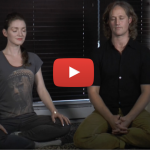Updated April 3, 2014.
You’ve probably heard that it takes about 10,000 hours to master a new skill.
That’s not a hard scientific fact, and there are definitely exceptions. But when you look into the science of meditation, you’ll find there’s a correlation between the time you put in and the transformation you get out.
Against the backdrop of this beautiful collage of exquisite scenes from the Himalayas, Buddhist monk, Matthieu Ricard explains the science of meditation (Video: 8 mins).
The Science of Meditation: Training Your Mind
There are certain capacities that an individual develops when they establish a regular practice of meditation. You learn how to master your inner world instead of being a slave to it. You become more adept at navigating your own thoughts and emotions and you decide what grabs your attention. But you don’t need 10,000 hours to train your mind in this way. According to Ricard, just a few months will do…
 Initial laboratory research inspired by the Mind and Life Institute showed there were differences in the brain wave activity of individuals based on how long they had practiced meditation. Those who had meditated for over 10,000 hours had the capacity to generate certain types of brain waves in specific areas of the brain. Those who had little experience in meditation had not developed the neural pathways to generate the same brain wave activity.
Initial laboratory research inspired by the Mind and Life Institute showed there were differences in the brain wave activity of individuals based on how long they had practiced meditation. Those who had meditated for over 10,000 hours had the capacity to generate certain types of brain waves in specific areas of the brain. Those who had little experience in meditation had not developed the neural pathways to generate the same brain wave activity.
These differences showed up in vigilance tests. Long term meditators were able to sustain unbroken attention for 45 minutes without their focus degrading. This far surpassed what one would normally expect. It usually takes just 5-10 minutes before the average person starts making mistakes in awareness-based exercises.
Good News for the Newbie
Follow-up research with new meditators was also published. Results showed that in just 3 months novice meditators also experienced significant changes. Most notably, there was evidence of greater resilience in the immune system of subjects, and identifiable changes in how their brains were processing emotions.
There’s much more to learn about the science of meditation, but one thing’s for sure. There’s scientific evidence that our brain structure and our neural capacities change over time with the practice of meditation. And these changes empower us to live our lives with greater awareness, and with more empathy for ourselves and each other.
Training your mind through sustained cultivation of inner qualities is something that does matter essentially, and it is something that can be done.
Bio: Matthieu Ricard is an active member of the Mind and Life Institute and is passionate about exploring the intersection between science and meditation. Trained as a biochemist, he is also a photographer, speaker and author. Ricard has spent over forty years in Tibet as a Buddhist monk and donates the proceeds of his work—and much of his time—to thirty humanitarian projects. You can learn more about his work here.
What can you share about your understanding of the relationship between science and meditation?


